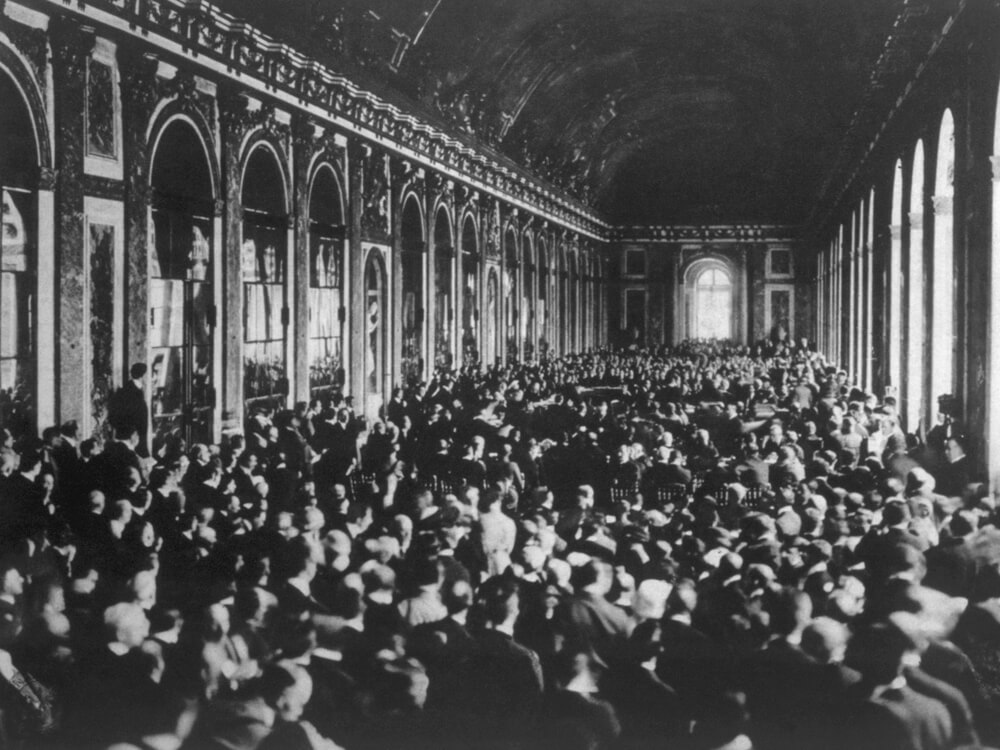Signing of the Treaty of Versailles, June 28, 1919
A century ago, the Treaty of Versailles ended what was then called the Great War. Fighting between the Central Powers (led by Germany) and the Allied Powers (which included Great Britain and France, joined by the United States) had ceased with the armistice announced on November 11, 1918, at 11:00 a.m. The treaty was named for the French Palace of Versailles, where it was signed on June 28, 1919. It brought only a short-lived peace. The global conflict it sealed would come to be known as World War I—because a second, far more devastating world war erupted just two decades later. Why did the treaty fail?
The treaty did not represent the “Peace without Victory” idealism that U.S. president Woodrow Wilson had called for in his “Fourteen Points” speech in January 1918. Instead, it stripped from Germany more than 26,000 square miles of territory in Europe, such as Alsace-Lorraine and part of western Prussia. It confiscated all of Germany’s overseas colonies and greatly restricted its military. The treaty imposed on Germany a severe monetary penalty of reparations for war damages to the victorious Allied nations, while laying blame for the war entirely on Germany and its allies. The global economic depression that hit in the late 1920s fueled Germans’ dissatisfaction with the Versailles Treaty. Adolph Hitler denounced the “diktat” (dictated peace), and the Nazi regime set about defying its terms. The fact that Hitler faced no consequences for Germany’s treaty violations emboldened him.
Most historians agree that the harsh treaty sowed the seeds of another war. Germans’ resentment for being blamed and made to pay for the catastrophe of the world war certainly contributed to the Nazis’ rise. But other factors also contributed to instability in Europe and undermined the treaty’s chance of success:
- emergence of the Communist Soviet Union
- refusal by the U.S. Senate to ratify the Treaty of Versailles
- resulting weakness of the League of Nations
- lack of enforcement of the treaty’s provisions
It is largely in comparison to the successful—and arguably much harsher—peace that ended World War II that the flaws of Versailles become clear.
Image credit: © Everett Historical/Shutterstock
Related Links:
- How the Treaty of Versailles and German Guilt Led to World War II
Background and basics of the Versailles Treaty and its historic impact.
(Source: History.com, June 29, 2018) - How the Treaty of Versailles Ended WWI and Started WWII
Conventional account of the historic Treaty of Versailles and its legacy.
(Source: NationalGeographic.com, May 31, 2019) - The Paris Peace Conference and the Treaty of Versailles
Recap from the Office of the Historian of the U.S. State Department.
(Source: Department of State, November 5, 2016) - The Lessons of the Versailles Treaty
Military historian Victor Davis Hanson argues not that the Versailles Treaty was too harsh, but that it wasn’t harsh enough. - (Source: National Review, July 25, 2019)
- The Treaty of Versailles, 1919
Watch the 10-minute video “Le Traité de Versailles,” narrated in French (with English subtitles/captions) and featuring photographs and newsreel footage, on the historic treaty signed in the palace’s “Hall of Mirrors.”
(Source: ChateauVersailles.fr; accessed August 7, 2019) - The Treaty of Versailles: What Did the Big Three Want? and Terms of the Treaty
Short two-part animated video explaining what shaped the Treaty of Versailles and its terms.
(Source: YouTube.com, November 5, 2016) - Treaty of Peace with Germany
Full text of the 15-part Versailles Treaty—all 240 pages!
(Source: Library of Congress; accessed August 7, 2019)




